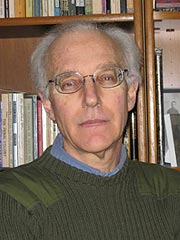The New Colonialism

 Ukraine is well acquainted with the old type of colonialism, projected by an imperial state onto a subject population. But today, it may be the object of a new type as well – one practiced not by an alien nation-state, but by a transnational socio-economic and ideological elite.
Ukraine is well acquainted with the old type of colonialism, projected by an imperial state onto a subject population. But today, it may be the object of a new type as well – one practiced not by an alien nation-state, but by a transnational socio-economic and ideological elite.
In recent years, Patrick F. Fagan and William L. Saunders have argued that the United Nations Committee on the Rights of the Child and Committee on the Elimination of Discrimination against Women, which review implementation reports by states that have signed the corresponding UN Conventions, are in fact undermining the family, human life, and religion (Fagan and Saunders, “Global Power Grab,” Touchstone, July-August 2011, pp. 37-43). In their view, these committees are dominated by “cultural Marxists” who attack the traditional supports of society, representing what they term “a totally different ‘civilization.’” A similar argument was made by Marguerite A. Peeters in “Hijacking Democracy: The Power Shift to the Unelected” (2001).She refers to the “new global ethic” being propagated by Non-Governmental Organizations (NGOs) in collusion with international bodies, which clashes with the traditional values of Third World countries. Last November, she presented some of these ideas at a conference in Warsaw (“Patriiarkhat” no. 6, November-December 2011, p. 33).
If these authors are correct, there is a conflict between the values of certain public international organizations on the one hand, and those of traditional cultures on the other. This would not be surprising: the European or European-educated elite that runs such organizations has been formed in a secular spirit, and the generation that grew up in the 1960s and has now come to dominate international political, economic, and social life was influenced by Marxism and post-modernism. Its values certainly conflict with the religious beliefs of traditional cultures, as well as with their norms of marriage and family life. To some extent, this conflict mirrors the current friction between secular elite culture and religious mass culture seen in the United States. Sociologist Peter L. Berger once called the U.S. a nation of East Indians ruled by Swedes – that is, of a highly religious population governed by a secularized elite. There is no need to theorize a conspiracy here, as Fagan and Saunders seem to do. One need not posit concerted action in pursuit of a common plan. This is a normal socio-political process, a simple succession of elites on a global scale. Like its predecessors, the new global elite works to project its particular ideals and values onto the world.
The picture that emerges of a secular culture or even a “totally different civilization”dominating various traditional, religiously based societies,bears a striking resemblance to colonialism. Are public international organizations the vectors of a new type of colonialism, representing not a particular nation-state, butrather a new international elite? Is this elite sustained by what Benjamin R. Barber calls “Mc World” – an unregulated, undemocratic global corporate capitalism that fosters consumerist and materialist values, undermining religion and traditional culture (Barber, “Jihad vs. McWorld,” 2001)?
One might object, of course, that the two phenomena are unrelated, even opposed. After all, Barber’s political response to “McWorld” is democratic revitalization in the public sphere, in part through the very kinds of international organizations which Fagan and Saunders regard as the enemies of traditional values. How couldthe “cultural Marxists” in such organizations be equated with the bearers of global capitalism?
But the contradiction is only apparent. Marxism and liberal capitalism have common roots in the Enlightenment and particularly in nineteenth-century materialist philosophy. The global elite’s hostility to traditional marriage, family, and religion may be either “Marxist” or “liberal capitalist,” depending on its ideological elaboration, but in either case it is based on a reductionist economic interpretation of transcendent values. Moreover, traditional values stand in the way of both Marxist and neo-liberal models of development and progress.Thus, for example, the traditional family is an obstacle to both the Marxist collective, andthe capitalist ideal of the autonomous individual consumer. Besides, the new global elite posited by Peeters, Fagan and Saunders, and the corporate elite that owns Barber’s “McWorld,” appear tohave common sociological origins. The phenomenon of international activists from privileged elite backgrounds propagating Marxist ideology is not uncommon – beginning with Karl Marx himself.
If the bearers of modern materialism constitute a colonizing international elite, then the colonized are not limited to one country or one continent. Ukraine has its place in this process. It is no secret, of course, that Ukraine has been the object of colonizers of a more traditional type. First came Russian imperial colonialism, which supplanted Ukrainian church culture with Russian imperial church culture, thus alienating much of the Ukrainian intelligentsia from religion altogether. Next came the secularizing Russian Bolsheviks, who initially attacked religion, marriage and the family, later assaulting Ukrainian culture as such.Today, remnants of Soviet ideology persist in some parts of Ukraine as part of the post-colonial culture of the creole elite. At the same time, the destruction of traditional Ukrainian religious culture has opened the way for a third wave of colonialism, once again in ecclesiastical garb. The Russian Orthodox Church proposes to fill the spiritual void left by the RussianBolsheviks. Thus, each successive wave of colonialism prepares the way for the next.
But traditional Ukrainian values are simultaneously threatened by a secularizing colonialism from the West -- not an American colonialism, as the Russocentriccreole elite likes to argue, but that of the new global elite. Although it is drawn from a variety of ethnic and religious traditions, its ethos is Western and secular. Even its best intentions are limited by its materialist world view. Its developmental ideal aims to supplant religion and tradition with a secular vision of material welfare. Its neo-liberal economic ideal promotes hyper-individualism and self-indulgence – the mass-psychological traits of the perfect market. It is thus compelled to break down such religious and cultural barriers to ideal market behavior as self-restraint, personal morality, modesty and thrift.
Thus, we may soon see public international organizations, local NGOs, and private multinational corporations purveying materialist lifestyles and philosophies in Kyiv and Kharkiv, Donetsk and Dnipropetrovsk, and even in predominantly Greek-Catholic Lviv. If this happens, there is sure to be a clash between secular and religious values in the spheres of marriage, family, and general lifestyle. And as is typical in colonial situations, the secularist colonizers will find and cultivate local collaborators to help them secure a foothold in the indigenous population. These co-opted cadres will themselves form an elite, much as the acolytes of British or French culture formed the post-colonial secular elites of Asia and Africa. At the same time, a current of popular resistance will also grow.
True, not all the fruits of colonialism are bitter. The British broughtcommon law, the parliamentary system, human rights and civil liberties, public health and economic progress. Similarly, the new global elite advocates indisputably beneficial principles like equal rights for women and minorities, environmental sustainability, health care and economic development. But it also acts as a cultural colonizer, imposing secular Western notions about gender roles and “reproductive health,” as well as neo-liberal views on the “free market.” These notions are based on false dichotomies between valid principles and traditional values. Thus, for example, the global elite seems to regard women’s equality as incompatible with women’s traditional family roles and even notions of modesty. Yet Islamic women have shown that the veil can be a symbol of dignity and empowerment. Similarly, the new colonizing elite regards equal civil rights for homosexuals, bisexuals, and transgendered individuals – a matter requiring prompt attention in places like Ukraine -- as mandating alegal redefinition of marriage to include same-sex unions. But such a move would compromise the family, which European and international human-rights law still regards as the essential building-block of a viable society, meriting state support. The new colonizersconsider Christian and Islamic objections to artificial birth control and abortion to be incompatible with sustainable population growth. Yet consistently applied natural family planning cankeep growth rates within a sustainable range. Similarly, economically efficient agriculture need not destroy the traditional village. While large-scale international agribusiness literally treads the same ground as Soviet-style collectivization, destroying the family farm and the village culture that it sustains in the name of high crop yields and profitability, micro-credit and other innovative programs can make village life and culture economically sustainable.
But for the colonizers from the new global elite, the religionsand even the cultures of developing countries are not priorities. Thus, the familiar colonialism from the East is not the only threat to Ukraine’s Catholic and Orthodox churches and her traditional Christian way of life. The new secular colonialism may prove even more corrosive than the old.










